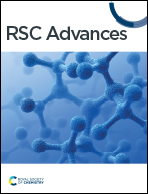Carvacrol inhibits bacterial polysaccharide intracellular adhesin synthesis and biofilm formation of mucoid Staphylococcus aureus: an in vitro and in vivo study
Abstract
Staphylococcus aureus (S. aureus) is one of the important human pathogens and causes both superficial and systemic infections. More importantly, the formation of S. aureus biofilms, a main cause of its pathogenicity and drug resistance, has been a critical challenge in clinical treatment. Carvacrol, a plant-based natural product, has gained great interest for therapeutic purposes due to its effective biological activity with low cytotoxicity. The present study aimed to investigate the effect of carvacrol on anti-biofilm activity. Growth curve analysis showed that applying a sub-inhibitory concentration of carvacrol (4 μg mL−1) was not lethal to S. aureus SYN; however, the inhibition rate of biofilm formation was as high as 63.6%, and the clearance rate of mature biofilms was as high as 30.7%. In addition, carvacrol effectively reduced the production of biofilm-associated extracellular polysaccharides and showed no effect on eDNA release. Furthermore, qPCR analysis revealed that carvacrol significantly down-regulated the expression of icaA, icaB, icaC, agrA, and sarA (P < 0.05). The in vivo efficacy of carvacrol against biofilm infection was further verified with a biological model of G. mellonella larvae. The results showed that carvacrol was non-toxic to the larvae and can effectively increase the survival rate of the larvae infected with S. aureus strain SYN.



 Please wait while we load your content...
Please wait while we load your content...